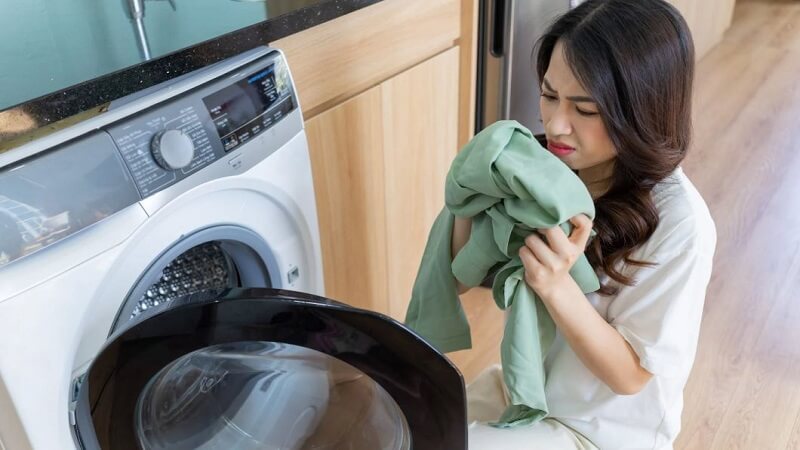A washing machine maintains clothing freshness as its basic function, but its odours can ruin all previous cleaning efforts. Washer odours arise because of common laundry practices and insufficient maintenance, resulting in musty-smelling clothing. The piece presents the five major washer odour causes while delivering step-by-step solutions to resolve them. The Appliance Repair Expert Appliancerepairexpert can handle tough washer repair cases efficiently, using their expert knowledge and experience to maintain peak washer performance quickly.
Why Washers Develop Odors
Washing machines develop odours mainly because moisture gets trapped within the machine or because detergent residue and accumulated debris lead to odour development. Мicroorganisms multiply rapidly in moist environments, creating conditions that produce bacteria, mould, and mildew in laundry rooms. Left unchecked, the stench can cling to clothes, defeating the machine’s purpose. Addressing these issues with washer maintenance tips keeps odours at bay and reduces the need for extensive repairs.
Reason 1: Dirty Drum and Residue Buildup
Soap, fabric softener, and dirt can accumulate inside the drum, creating a slimy layer that breeds odor-causing bacteria. To fix this:
- Run an empty hot cycle with two cups of white vinegar poured into the drum to break down residue.
- Follow with a cycle using a half-cup of baking soda to neutralize smells and scrub grime.
- Wipe the drum with a microfiber cloth afterward to remove loosened debris.
- This simple routine restores freshness and is key to washer odour removal.
Reason 2: Clogged Drain Pump Filter
Food scraps, lint, or small items like coins can clog the drain pump filter, trapping water and fostering a stale smell. To address it:
- Remove the filter (usually behind a small panel at the machine’s base).
- Rinse it under warm water to clear blockages, checking for trapped objects.
- Reinstall and run a short cycle to test drainage.
- Regular filter cleaning is a top washer maintenance tip to prevent odours and potential pump damage.
Reason 3: Moldy Door Gasket
Front-load washers often develop mould around the rubber door gasket due to trapped moisture after cycles. To tackle this:
- Wipe the gasket with a mix of equal parts water and vinegar, using a cloth to reach crevices.
- Dry it thoroughly with a towel to stop mould regrowth.
- Leave the door ajar between uses to air it out.
- Persistent mould might signal a need for washer repair if the gasket is too worn, which a job Appliance Repair Expert can handle efficiently.
Reason 4: Stagnant Water in the System
Water left sitting in the drum, hoses, or pump after a wash can turn sour, especially in machines not used daily. To fix:
- Run a hot cycle with a cup of bleach (check the manual for compatibility) to kill bacteria.
- Drain any standing water by running an empty rinse cycle afterward.
- Use the machine regularly, or leave the lid open to dry it out.
- This step is crucial for washer odour removal and prevents long-term stench buildup.
Reason 5: Overuse of Detergent
Excess detergent leaves a sticky residue that traps dirt and encourages mildew growth, leading to a dank smell. To correct it:
- Cut detergent use by half for a few cycles to flush out buildup—follow the machine’s load guidelines.
- Switch to a high-efficiency (HE) detergent if using a modern washer.
- Run a vinegar cycle monthly to dissolve lingering soap scum.
- Adjusting habits like this ties into washer maintenance tips for odour-free results.
Hard Water’s Role in Washer Odors
Hard water—loaded with minerals like calcium—can worsen smells by leaving deposits that harbour bacteria. These layers build up in the drum and hoses, amplifying odour issues. A water softener or adding a half-cup of vinegar per load can reduce mineral accumulation. For severe cases, professional washer repair Canada can assess and clean internal components affected by hard water, protecting the machine’s longevity. In addition to the smell and hard water, people often wonder why their washer not draining properly. If you can still try to eliminate the smell yourself, this is definitely not a problem you should have, because you need to disassemble the machine and look at the problem from the inside. Only experienced professionals can help you with this.
Budget-Saving Odor Solutions
Fixing washer smells doesn’t demand a big spend. Vinegar costs $2-$3 for multiple uses, baking soda is under $1 per box, and HE detergents range from $10-$20 for months of washes. A water softener might cost $500-$1,500 but saves on appliance wear. Compare that to washer repair fees—typically $100-$300—and DIY fixes are cost-effective.But you need to find out affordable rates for professional help directly when needed from an Appliance Repair Expert.
Signs It’s Time for Expert Help
Some smells hint at deeper mechanical faults that require more than home remedies. Persistent odors after cleaning might mean a blocked hose or failing pump trapping water. Odd noises, leaks, or poor drainage also suggest trouble. Professional washer repair Canada from Appliance Repair Expert uses precise diagnostics and OEM parts to fix these issues, preventing small problems from growing into costly failures. Their expertise ensures a thorough solution tailored to your machine.
Final thoughts
Bad washer smells stem from five main sources—dirty drums, clogged filters, mouldy gaskets, stagnant water, and excess detergent—all fixable with straightforward steps. Washer odour removal using vinegar, baking soda, and regular filter checks tackles these culprits fast, while smart detergent use and drying habits prevent a recurrence. Hard water adds a twist, but softeners or additives keep it in check. For stubborn cases, professional Washer Repair Canada by Appliance Repair Expert delivers lasting results, keeping this vital appliance fresh and functional among large household workhorses.

